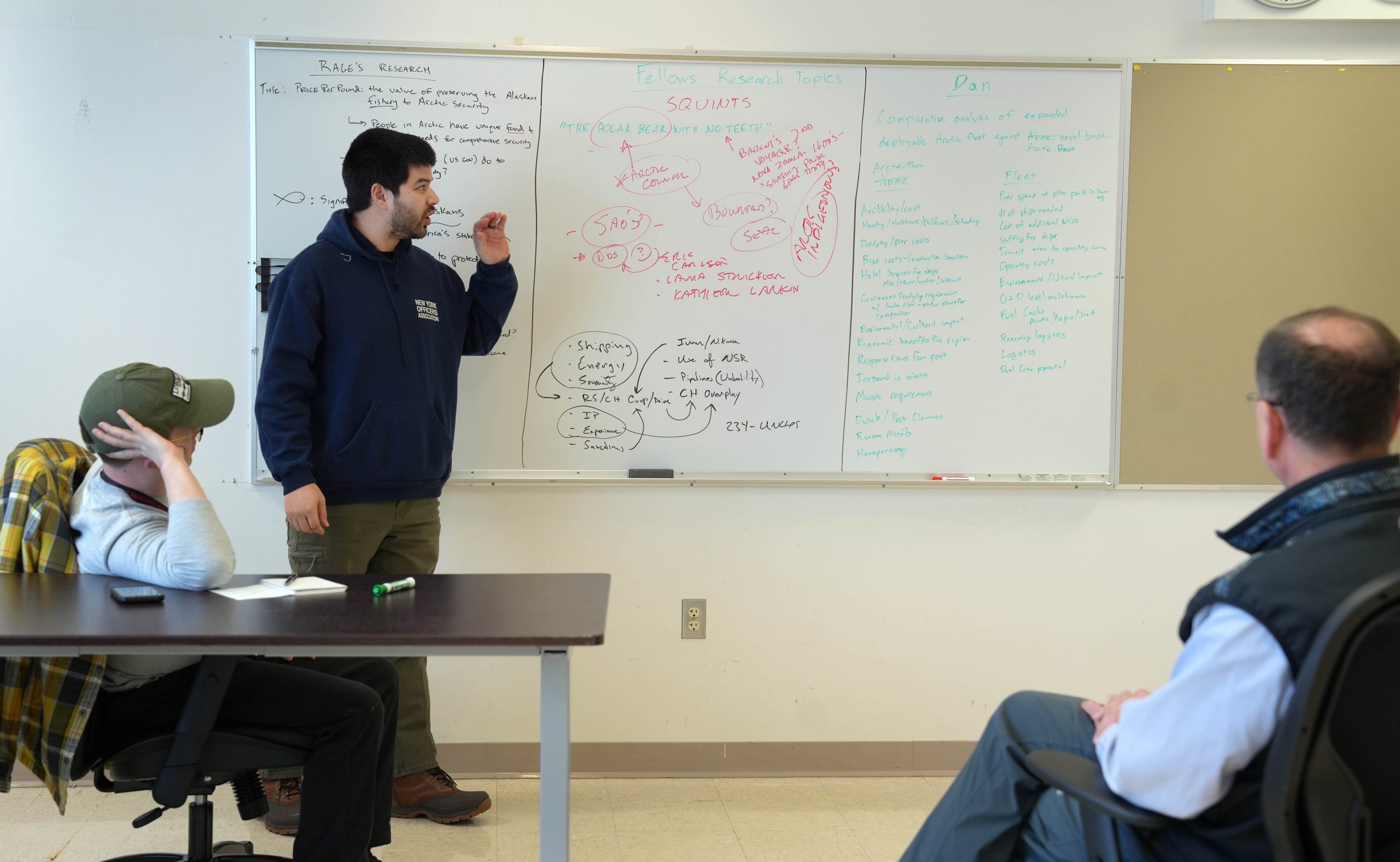
In its inaugural year, the Ted Stevens Center’s Arctic Fellowship program is aimed at cultivating a cadre of security practitioners with a nuanced understanding of Arctic security dynamics. The program, in partnership with the University of Alaska, is designed to equip military leaders with the expertise required to navigate the complex geopolitical and geophysical landscape of the Arctic.
Currently, the program has three fellows: two from the U.S. Air Force, on track to graduate this May after a one-year program, and one from the U.S. Coast Guard, who has one more year remaining in the two-year program. Upon completion of the fellowship, all participants will earn a master’s degree, but most notably they will have gained valuable firsthand knowledge and experience while engaging on a wide-range of Arctic security topics and issues.
The Arctic Fellowship program, developed in alignment with U.S. National Security and DoD strategic objectives, offers participants a comprehensive educational experience. Through engagement with the Ted Stevens Center and the University of Alaska, fellows gain expertise in areas crucial to the DoD mission(s) in the Arctic.
“Developing the future Arctic leaders through professional engagements, professional development, travel, research, and education is crucially important,” explained Capt. Grant Thomas, U.S. Coast Guard Liaison and Arctic Fellows coordinator. He highlighted the program’s significance in addressing critical issues outlined in national defense and security strategies, citing the Arctic’s strategic importance in global geopolitics.
“Establishing relationships and understanding the various intersection of issues impacting the Arctic is crucial,” Thomas remarked.
He emphasized the program’s role in fostering trust and collaboration through interactions with civilian educators, government agencies, and international partners. ” The essence of security cooperation is building trust and relationships,” he stated.” This program is designed to do just that.”
“The majority of Americans probably do not see the U.S. as an Arctic nation,” Thomas noted. “We collectively need to change that narrative, and this program is a very important piece in doing so.” This program helps grow and shape future DoD leaders with the Arctic knowledge, networks of subject matter experts, and critical development in this rapidly changing region.
The program’s objective is clear: to develop leaders with a deep understanding of the Arctic’s role in international security and civil-military affairs. By providing participants with opportunities for research, education, and engagement, the fellowship equips the participants to be knowledgeable regarding U.S., allied, and DoD Arctic security priorities effectively in their future roles.
As the program looks toward the future, efforts are underway to expand its reach to the Army and Marine Corps, in addition to the Space Force and Navy. The program’s continued refinement aims to strike the right balance between civilian education and firsthand Arctic experiences as part of the Ted Stevens Center’s Arctic Fellows program, ensuring that future leaders are well-prepared to navigate the complexities of the region.
“This program is a phenomenal opportunity for all of the service components,” remarked Captain Thomas.” It addresses a myriad of critical issues highlighted in our National Defense, National Strategy for the Arctic, and Security Strategies, underscoring the strategic importance of the Arctic in global geopolitics.”
As the program moves forward, it will continue to evolve to meet the specific needs of each service branch. With a commitment to refinement and growth, the TSC’s Arctic Fellowship program is poised to become an indispensable resource for developing future Arctic leaders across the military spectrum.
Photo by Amber Kurka | Lt. Cmdr. Daniel Jones, U.S. Coast Guard Arctic fellow, shares his final project ideas with peers and the leaders at the Ted Stevens Center for Arctic Security Studies, during a monthly fellowship meeting at the center on Joint Base Elmendorf-Richardson, Alaska, Feb. 14, 2024. Jones is one of three fellows participating in the first iteration of the TSC’s Arctic Fellowship program. The program, in partnership with the University of Alaska, is designed to equip military leaders with the expertise required to navigate the complex geopolitical and geophysical landscape of the Arctic. View Image Page
